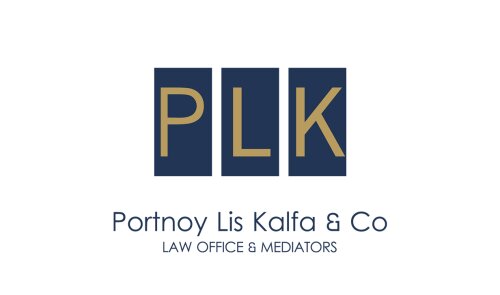Best Domestic Violence Lawyers in Ashdod
Share your needs with us, get contacted by law firms.
Free. Takes 2 min.
Free Guide to Hiring a Family Lawyer
List of the best lawyers in Ashdod, Israel
About Domestic Violence Law in Ashdod, Israel
Domestic violence is a serious concern in Ashdod, as it is throughout Israel. The law defines domestic violence as a range of harmful behaviors within the family or intimate relationships, including physical, emotional, sexual, economic, and psychological abuse. Israeli law aims to protect victims by providing avenues for reporting abuse, obtaining restraining orders, and pursuing criminal charges against perpetrators. Law enforcement and social services in Ashdod are equipped to respond to incidents, offer protection, and connect victims with relevant support services.
Why You May Need a Lawyer
If you are experiencing or accused of domestic violence in Ashdod, seeking legal advice is crucial for several reasons. Victims may require assistance with filing complaints, obtaining restraining orders, navigating child custody issues, or securing safe housing. Legal counsel helps ensure your rights are protected and guides you through the legal processes. Those accused of domestic abuse also need legal representation to defend themselves, understand the charges, and participate fairly in investigative and court proceedings. A lawyer can also help mediate family disputes and provide clarity regarding entitlements and obligations under the law.
Local Laws Overview
Israel's Prevention of Domestic Violence Law (1991) provides the main legal framework to address domestic abuse, and these laws are fully applicable in Ashdod. The law allows courts to issue protective orders, which can restrict an abuser from approaching or making contact with the victim, remove them from the shared residence, and prohibit the possession of weapons. Violating these orders is a criminal offense. The police have powers to investigate claims and detain suspects immediately if there is imminent danger. Social workers and the Family Courts play a vital role in handling cases, ensuring both immediate safety and long-term support for victims. The courts can expedite urgent hearings, especially when children are involved or when lives are at risk.
Frequently Asked Questions
What should I do if I am experiencing domestic violence in Ashdod?
If you are in immediate danger, contact the police (dial 100) right away. You can also approach social services or a domestic violence shelter for immediate help and guidance. Documenting incidents and saving evidence can assist in future legal proceedings.
How do I obtain a restraining order in Ashdod?
You can apply for a protective or restraining order at the Family Court or Magistrate's Court. A lawyer or social worker can help with the application, and the court can issue an emergency order, often on the same day, if there is sufficient evidence of threat or abuse.
What kinds of abuse are considered domestic violence under Israeli law?
The law recognizes physical, sexual, emotional, economic, and psychological abuse. Harassment, threats, controlling behavior, and destruction of property are also covered.
Do I need evidence to take legal action?
While evidence such as medical reports, photographs, messages, and witness testimonies strengthen your case, the court can rely on your sworn statement and any available evidence when making a decision, especially for urgent cases.
Can I file a police complaint anonymously?
You can file a complaint and request confidentiality, but for legal proceedings and restraining orders to move forward, your identity will likely need to be disclosed to ensure due process.
What are the consequences for violating a restraining order?
Violating a restraining order is a criminal offense in Israel. The police can arrest the perpetrator, and they may face additional penalties, including fines and imprisonment.
How can a lawyer help me as a victim of domestic violence?
A lawyer can guide you through the legal steps, help gather evidence, represent you in court, and ensure your interests are protected regarding custody and property matters.
What should I do if I am falsely accused of domestic violence?
Contact a criminal defense lawyer immediately. A lawyer can help you understand your rights, build your defense, and represent you to avoid unwarranted penalties or orders.
Can domestic violence affect child custody decisions?
Yes, evidence of domestic violence can significantly affect custody and visitation arrangements. The court prioritizes the best interests and safety of the child when making decisions.
Where can I turn for help in Ashdod if I do not speak Hebrew?
Many organizations and lawyers in Ashdod offer services in multiple languages, including Russian, Arabic, Amharic, and English. Ask when contacting a service for language support.
Additional Resources
Several organizations and authorities provide help in domestic violence situations in Ashdod and throughout Israel. The Ministry of Welfare and Social Services operates local family and child protection units. The police have special domestic violence units. Shelters and hotlines operate around the clock, providing emergency refuge, counseling, and practical support. Examples include:
- Ministry of Welfare and Social Services
- Local Social Services Department in Ashdod Municipality
- Police Domestic Violence Hotline
- Women’s shelters and crisis centers in Ashdod and surrounding areas
- Legal Aid Bureaus (publicly funded legal assistance where eligible)
Next Steps
If you or someone you know is facing domestic violence in Ashdod, you should prioritize safety and contact the police for urgent help. You can then reach out to a lawyer who specializes in domestic violence cases to discuss your legal options, rights, and next steps. Gather and keep any evidence of abuse. Contact social services or a crisis center for shelter, counseling, or support services as needed. If you are financially eligible, consider applying for government-funded legal aid. Remember, you are not alone, and help is available through both legal and social support networks.
Lawzana helps you find the best lawyers and law firms in Ashdod through a curated and pre-screened list of qualified legal professionals. Our platform offers rankings and detailed profiles of attorneys and law firms, allowing you to compare based on practice areas, including Domestic Violence, experience, and client feedback.
Each profile includes a description of the firm's areas of practice, client reviews, team members and partners, year of establishment, spoken languages, office locations, contact information, social media presence, and any published articles or resources. Most firms on our platform speak English and are experienced in both local and international legal matters.
Get a quote from top-rated law firms in Ashdod, Israel — quickly, securely, and without unnecessary hassle.
Disclaimer:
The information provided on this page is for general informational purposes only and does not constitute legal advice. While we strive to ensure the accuracy and relevance of the content, legal information may change over time, and interpretations of the law can vary. You should always consult with a qualified legal professional for advice specific to your situation.
We disclaim all liability for actions taken or not taken based on the content of this page. If you believe any information is incorrect or outdated, please contact us, and we will review and update it where appropriate.









